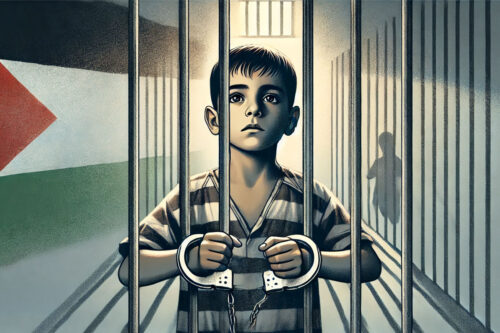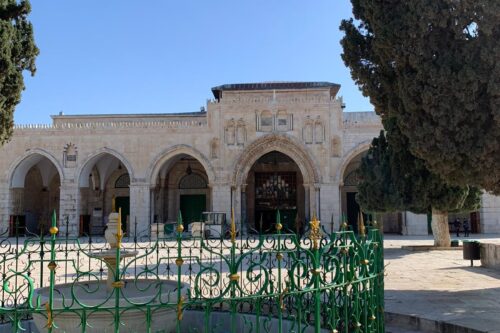Remembering the First Intifada – Decades of resistance and the unfulfilled promise of peace
![81290-000-81 Palestinian protestors confront Israeli troops in Gaza City, 1987, during the First Intifada [21 Dec 1987, Sharir Efi / Israel Press and Photo Agency (I.P.P.A.) / Dan Hadani collection, National Library of Israel / Wikimedia]](https://www.interpal.org/wp-content/uploads/2024/11/Intifada_in_Gaza_Strip_1987_V_Dan_Hadani_Archive-e1731173371643-1067x800.jpg)
December 9th, 2024, marks the 37th anniversary of the First Intifada, an uprising that ignited in 1987 and would forever change the Palestinian struggle for freedom. For over five years, Palestinians rose up in protest against the Israeli occupation, in a movement that spanned cities, villages, and refugee camps across the occupied West Bank and Gaza.
Today, we reflect on the courage of those who participated in this momentous chapter, the context that led to the uprising, and the decades-long struggle for justice that continues in Palestine.
The Roots of the First Intifada: A Response to Occupation and Oppression
The First Intifada, or “uprising” in Arabic, emerged from decades of oppression under Israeli occupation, which started in 1948 with the Nakba, but intensified in 1967 after the Six-Day War. Under occupation, Palestinians faced severe restrictions on movement, land confiscation, military checkpoints, and curfews that stifled daily life and aspirations. Settlements expanded on Palestinian land, forcing families from their homes and restricting access to basic resources like water and fertile land.
On December 8, 1987, four Palestinian workers were killed by an Israeli military vehicle in Gaza, sparking widespread anger. The following day, protests erupted across Gaza and the West Bank, marking the beginning of the First Intifada.
This movement was unique in its grassroots nature, driven by communities and mainly organised by youth and local leadership. Thousands of Palestinians participated in peaceful demonstrations, general strikes, and boycotts, challenging the occupation with resilience and unity. However, the Israeli response was marked by heavy-handed violence, leading to mass arrests, injuries, and the deaths of hundreds of Palestinians.
The Oslo Accords: A Hope for Peace?
The world took notice, and in the early 1990s, efforts toward a peace process began. The Oslo Accords were signed in 1993 as a supposed path to a two-state solution and an end to the occupation. Through these accords, Israel and the Palestine Liberation Organisation (PLO) recognised each other’s right to exist and set a framework for Palestinian autonomy in parts of the West Bank and Gaza, with the hope of an independent Palestinian state within five years.
Oslo brought hope for Palestinians that justice and sovereignty were within reach. However, key elements of the agreement—such as the withdrawal of Israeli military forces from occupied territories, the cessation of settlement expansion, and the establishment of an independent Palestinian state—were never fulfilled. Instead, the number of Israeli settlements in the West Bank nearly doubled after Oslo, and restrictive measures on Palestinians increased. As time passed, it became clear that the promises of Oslo remained largely symbolic, with little progress toward tangible change for Palestinians on the ground.
Broken Promises and Continued Palestinian Suffering
Since the signing of the Oslo Accords in 1993, Palestinian suffering under occupation has continued and, in many ways, intensified. Checkpoints, land seizures, and a complex system of permits restrict movement and access to essential services, while settlement expansions have claimed vast areas of Palestinian land. Gaza has faced devastating blockades and repeated military operations, leaving a population of two million people in dire humanitarian conditions.
Generations of Palestinians have grown up with memories of the First Intifada as a symbol of resistance, but they have also witnessed ongoing displacement, violence, and systemic deprivation. Palestinian youth today live under the same oppressive conditions that sparked the First Intifada. In Gaza and the West Bank, unemployment rates soar, and many are denied the right to travel, work, or even access critical medical care. For families in refugee camps, the dream of return and freedom remains a distant aspiration.
A Call for Justice and True Peace
On this anniversary, we honour the bravery and sacrifice of those who peacefully participated in the First Intifada. Their actions underscored an enduring truth: peace without justice is not sustainable. The international community must remember the original demands for dignity, freedom, and self-determination that sparked the uprising and recognise that these rights remain unfulfilled.
As we remember the start of the First Intifada, let us renew our commitment to standing in solidarity with Palestinians who continue to resist oppression and seek a just and lasting peace.
37 years on from the First Intifada, the situation for Palestinians – both in the West Bank and Gaza – remains as dire as it was then, perhaps even worse, with the continued settlement expansions in the West Bank and the blanket destruction of almost all buildings and infrastructure in Gaza.
Today’s Palestinian struggle for dignity and independence echoes the spirit of 1987, and it is a call to us all to support their rights, challenge ongoing injustice, and work toward a future where every Palestinian can live in freedom and security.
Calculate your Zakat
Confused about how to calculate your Zakat? Try our simple-to-use calculator

![A Shadow R1 spy aircraft operated by the UK's Royal Air Force, accused of supporting the genocide in Gaza [Jerry Gunner / Wikimedia]](https://www.interpal.org/wp-content/uploads/2025/04/1768px-Shadow_R1_5AC_Sqdn_RAF_Waddington_this_morning-e1745166357309-500x333.jpg)

![Fighters from Israel's pre-state militia occupying the village of Deir Yassin, April 1948 [IDF archive / Wikimedia]](https://www.interpal.org/wp-content/uploads/2025/04/Jewish_militias_in_the_village_of_Deir_Yassin_April_1948_cropped_and_edited-e1745166391491-500x333.jpg)

